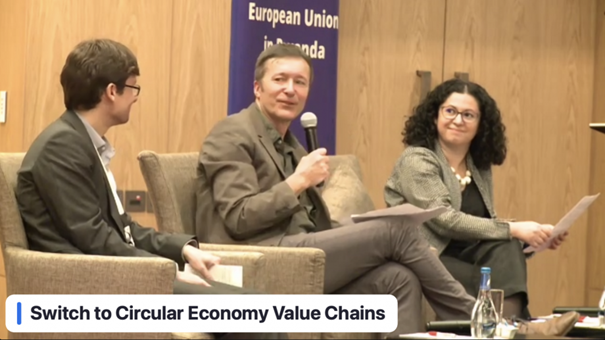What are the implications of EU circular policies on producers and exporters in developing countries and what can be done to maximize benefits and mitigate potential trade barriers?
The World Circular Economic Forum #WCEF2022 is looking at core themes relevant to #Africa’s sustainable development and will explore cross-cutting themes to act as enablers for the #CircularEconomy transition. One key issue issue concerns trade and value chains:
What are the implications of EU circular policies on producers and exporters in developing countries and what can be done to maximize benefits and mitigate potential trade barriers?
These were the main questions discussed at the WCEF Accelerator Session “Circular policies without borders” – accelerator session co-hosted and DG INTPA with UNIDO(link is external), Chatham House(link is external), Circle Economy(link is external), European Investment Bank(link is external), and the SWITCH to Green Facility(link is external).
The event was opened by the EU Ambassador to Rwanda, Belén Calvo Uyarra, who reconfirmed the EU’s actions and support towards a circular transformation, with the European Green Deal and the new EU Circular Economy Action Plan. She emphasized that with the EU Circular Economy Action Plan, Europe has a clear roadmap to transition to a circular low-carbon economy at home, and to work with partners around the world. The European Green Deal underlines that the challenges of climate change and environmental degradation require a global response. The EU’s approach is to set a credible example, and to use its diplomacy, trade policy, development support and other external policies to promote the green transition globally.
Bernard Crabbé from the European Commission, DG INTPA, as a member of the panel discussion, also confirmed the EU’s commitment to lead a just transition to lower carbon emissions and lean towards the circular economy.
Patrick Schroeder, senior research at Chatham House, shared insights from a recent policy paper developed under the EU-funded Switch to Circular Economy Value Chains project – “The EU’s circular economy transition: Opportunities and challenges for trade partners in emerging markets”.(link is external) He highlighted that producers in developing countries are facing increasing pressure to provide recyclable packaging for products to access the EU market and multinationals’ portfolios. Sourcing high-quality recycled content will be a critical strategy to ensure resilience, and producers who shift to circular packaging solutions can expect stronger demand, especially if materials are traceable and impacts are third-party verified.
The panel was also joined by Sheryn Ziani from Coalition for Waste Valorization (COVAD) and Masrur Reaz from Policy Exchange, both research institutes from Morocco and Bangladesh, respectively. They provided valuable insights on the policy, trade, and finance context for the circular economy in the plastic packaging and textile sectors in their countries.
Some of the main conclusions from the panel discussion are:
- The European Green Deal acts as the roadmap for EU’s vision to get to climate-neutrality by 2050; the EU Circular Economy Action Plan is at the heart of this roadmap and contains measures to make industry and society more circular and resource-efficient; this starts by leading by example in the EU itself and extends to the engagement internationally with manufacturing countries
- Three main trends have been identified in the circular economy arena: 1) increasing voluntary circularity commitments by the industry; 2) changes in consumer preferences – partially driven by the recent pandemic which to some extent has shown consumer readiness for lifestyle change; 3) and increased innovation and technology. This is especially evident in material science, with a proliferation of new, recyclable and sustainable materials.
- As the largest single-market worldwide, the EU with 27 Member States and a 440 million population remains among the most open markets for developing countries. As such, collaboration and enabling policy environment are needed to create opportunities instead of barriers to trade.
- The process of transitioning towards a circular economy is complex and multi-layered. A just transition requires changes at policy, industry, and consumer levels. Support should be provided to producers and exporters in developing countries to increase their capacities to fulfill the circular economy requirements and to be included in the circular transition.
You can watch the full session recording on Youtube(link is external)
This accelerator session is co-organised by @EUPartnerships @EIB #Switch2Green @SwitchMed @switchtocircular.eu@UNIDO @ChathamHouse @CircleEconomy
#WCEF2022 is looking at core themes relevant to #Africa’s sustainable development and will explore cross-cutting themes to act as enablers for the #CircularEconomy transition.

